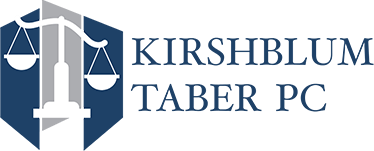
Nassau County Will Lawyer
Preparing for the Future Across Long Island & Beyond
What goes into drafting a will? How might a will be used for your assets and future heirs? A last will and testament has significant implications for the future of your assets and your loved ones. While you cannot predict the future, you can prepare for it. At Kirshblum Taber PC, we help clients draft wills that protect their property and estate, as well as care for the loved ones they've left behind. Whether you seek to establish the distribution of your property or name a legal guardian for any minor children, a will can help keep your future on track, even when you're gone.
When drafting a will, consider the specific contingencies and life changes that can affect your estate planning. For example, how will your assets be reallocated if a listed beneficiary predeceases you? Additionally, understanding the tax implications and potential for estate tax can significantly influence how you decide to structure your will. At Kirshblum Taber PC, we assist in these comprehensive considerations, ensuring your will is adaptable and robust, reflecting your evolving circumstances and intentions.
To speak with our experienced Nassau County will lawyers, call us at (516) 908-8842 or contact us online today.
Why Do Residents of Nassau County Need a Will?
Living in Nassau County, you are part of a vibrant community with unique needs and concerns. The Nassau County Surrogate's Court is a key local government entity that handles matters related to wills and estates. This local knowledge ensures that your last will and testament is compliant with all regional regulations, providing peace of mind for you and your loved ones.
One common concern among Nassau County residents is the high cost of living and property values. Ensuring that your assets are distributed according to your wishes can prevent potential disputes and financial strain on your heirs. Additionally, with the presence of numerous local parks and recreational areas, many residents have specific wishes regarding the preservation and use of their property. We understand these local nuances and can help you draft a will that reflects your values and priorities.
In addition to these concerns, for business owners in Nassau County, having a clear succession plan is crucial. A will can designate how business interests are handled, ensuring continuity and safeguarding the livelihood of employees and stakeholders. Our team at Kirshblum Taber PC provides tailored guidance to incorporate business succession plans into your estate strategy, aligning with both personal and professional objectives.
What Can a Will Do?
A will is a written legal document of what you want to happen to your property after you die. In particular, a will can:
- leave specified property to people or organizations (like charities);
- name a trusted person to manage the property you leave to your minor children;
- name a personal guardian to care for your minor children;
- name an executor to make sure the terms of your will are carried out.
Your will must be filed in the Surrogate's Court and admitted for probate before everything is distributed according to its terms. If your estate was worth less than $50,000 of personal property, then your will may instead go through the small estate (voluntary administration) procedure. However, wills are required to go through probate court (as opposed to trusts), and the duration of the process will depend on the size of your estate.
It is important to have a will because if you die without one, your property will simply be distributed according to New York "intestacy" laws, which pass down your property to your closest relatives, beginning with your spouse and children and down to your aunts and uncles. If the court exhausts your list of relatives, the state will take your property.
In situations involving blended families or unique personal circumstances, a will can be even more vital. It allows you to clarify your intentions and reduce the risk of misunderstandings or disputes among your beneficiaries. Moreover, if you have specific wishes regarding the upkeep of family heirlooms or the future of family-owned real estate, these details can be meticulously outlined in your will. Addressing these factors with a will ensures that your unique family dynamics and personal sentiments are fully respected.
Essential Steps to Legally Create a Will in New York
Anyone who is an adult (18 years or older) and of sound mind may create a will. Note that "sound mind" simply means that you know the purpose of the will you are drafting and the nature of your property. To validate a will, you must sign the document in the presence of two disinterested witnesses, who must also sign their names.
It is possible to revoke or change your will at any time you choose to do so by:
- destroying the document (such as by burning, tearing, or canceling it);
- ordering someone else to destroy the document in front of you and two other witnesses;
- making an entirely new will; or
- making a new written document that declares you are revoking your will (this must also be witnessed and signed by two witnesses).
If you only have a small change to make and do not want to have to remake a new will, you can add an amendment (called a codicil) at the end of your existing will and finalize the change with the same procedure as making your original will (declaring and signing before two witnesses).
It’s also advisable to periodically review your will, especially after major life events, such as marriage, divorce, or the birth of a child. This ensures that all your stipulations remain current and applicable. At Kirshblum Taber PC, we recommend setting up scheduled reviews to prevent any outdated provisions from causing unintended issues during the probate process. These proactive measures help safeguard your estate's integrity and your beneficiaries' interests.
Contact Our Nassau County Will Lawyer Today!
At Kirshblum Taber PC, we are committed to serving the Nassau County community by providing personalized and knowledgeable legal services. We understand the local landscape and the specific challenges you may face. Whether you are concerned about estate taxes, property distribution, or guardianship for minor children, we are here to help you navigate these complexities with confidence.
How Wills Impact Estate Taxes in Nassau County
Understanding the implications of estate taxes when creating a will is essential, particularly in Nassau County. Estate taxes can significantly reduce the value of your estate that is passed on to your heirs. By planning ahead, you can minimize these taxes and maximize the inheritance left to your loved ones. New York State imposes its own estate tax, which is separate from the federal estate tax. The current exemption threshold for New York is $6.11 million, meaning estates valued above this may be subject to taxes.
At Kirshblum Taber PC, we offer guidance on how strategic planning can mitigate tax liability. This includes the use of trusts or charitable contributions within your will, both of which can effectively decrease the taxable portion of your estate. Utilizing annual gifting strategies can also be an effective tool, allowing the transfer of smaller portions of your estate over time without tax penalties. For residents of Nassau County, where property values are considerably high, understanding these strategies is crucial in preserving your estate's value.
Digital Assets & Your Will
As we continue to advance in a digital age, incorporating digital assets into your will is becoming increasingly important. Digital assets can encompass a wide range of items, including social media accounts, digital photos, cryptocurrencies, and even online business ventures. Failure to address these in your estate planning could lead to confusion and loss of personal or financially valuable information.
At Kirshblum Taber PC, we guide our clients in cataloging their digital assets and incorporating them into their will. This includes ensuring access details are managed correctly, outlining your wishes regarding digital assets, and designating a digital executor if necessary. Considering the rapidly evolving technological landscape, it is beneficial to regularly update this portion of your will, as new digital assets may emerge. By addressing these elements, you can ensure a well-rounded and comprehensive estate plan that reflects both your tangible and digital legacy.
To speak with our experienced Nassau County will lawyers, call us at (516) 908-8842 or contact us online today.
Top Advantages of Drafting a Will with a Nassau County Will Lawyer
Having a will in New York, or any state for that matter, offers several critical benefits that can significantly ease the lives of your loved ones and ensure your wishes are respected after you pass away.
- Asset Distribution: A will allows you to specify how you want your assets and property to be distributed among your beneficiaries. This ensures your estate is distributed according to your wishes, minimizing potential conflicts.
- Guardianship for Minors: If you have minor children, a will enables you to name a guardian who will care for them in the event of your death. This provides crucial peace of mind for both you and your children.
- Executor Designation: You can appoint an executor in your will, someone you trust to manage and distribute your estate. This simplifies the probate process and ensures your estate is handled efficiently.
- Tax Efficiency: A will can be structured to minimize estate taxes and other fees, allowing your beneficiaries to retain a larger portion of the estate.
- Avoiding Intestacy Laws: Without a will, your estate may be subject to intestacy laws, where the state decides how to distribute your assets. Creating a will ensures your wishes prevail over default legal provisions.
- Peace of Mind: Perhaps most importantly, having a will offers peace of mind, knowing that your affairs are in order and your loved ones will be taken care of according to your instructions.
In New York, consulting with an estate planning attorney to create a will tailored to your unique situation is highly advisable. They can provide legal guidance to ensure your will is valid, comprehensive, and reflects your true intentions.
Expanding on these advantages, a will can also empower you to protect vulnerable family members by establishing special provisions or trusts. For example, if there are family members who require special medical care or who cannot manage financial assets independently, a will can outline specific arrangements to meet these needs. At Kirshblum Taber PC, our knowledgeable legal team will assist you in structuring these vital provisions into your estate planning.
A will can also strengthen charitable commitments. If philanthropy is an important part of your legacy, you can ensure your charitable contributions are part of your will. This strategy not only supports causes you are passionate about but can also provide significant tax benefits to your estate. Our attorneys at Kirshblum Taber PC can guide you in creating sustainable charitable plans that align with your values and financial goals.
Understanding Local Needs for Last Wills in Nassau County
Living in Nassau County, you are part of a vibrant community with unique needs and concerns. The Nassau County Surrogate's Court is a key local government entity that handles matters related to wills and estates. This local knowledge ensures that your last will and testament is compliant with all regional regulations, providing peace of mind for you and your loved ones.
One common concern among Nassau County residents is the high cost of living and property values. Ensuring that your assets are distributed according to your wishes can prevent potential disputes and financial strain on your heirs. Additionally, with the presence of numerous local parks and recreational areas, many residents have specific wishes regarding the preservation and use of their property. We understand these local nuances and can help you draft a will that reflects your values and priorities.
At Kirshblum Taber PC, we are committed to serving the Nassau County community by providing personalized and knowledgeable legal services. We understand the local landscape and the specific challenges you may face. Whether you are concerned about estate taxes, property distribution, or guardianship for minor children, we are here to help you navigate these complexities with confidence.
As Nassau County is diverse in its community fabric, wills can also address multi-generational living arrangements that are common in the area. For families with eldercare responsibilities or shared property usage, we provide insight into how a will can coordinate these shared living situations into your estate plan. Our team also advises on how to handle property located outside of New York State to ensure comprehensive coverage of your assets.
The Role of a Power of Attorney in Estate Planning
A power of attorney (POA) is a crucial part of estate planning. It designates someone you trust to make important decisions on your behalf if you become unable to do so. This document can apply to both financial and healthcare decisions, ensuring that your affairs are managed according to your wishes.
Key Benefits of a Power of Attorney:
- Financial Decisions: A POA allows someone to handle your finances, pay bills, manage investments, or sell property.
- Healthcare Decisions: If you're incapacitated, a healthcare POA lets someone make medical decisions on your behalf.
- Peace of Mind: Knowing that someone you trust can take over important duties can ease the burden on your family members in difficult times.
A POA can work in conjunction with your will and other estate planning documents, covering all bases to ensure that both your personal and financial needs are met.
A well-structured POA can also include stipulations for specific financial strategies. For example, you can make provisions for investment tactics, including the types of investments to pursue or avoid. This ensures the preservation of your financial philosophy during periods when you might not be able to provide direction directly. Furthermore, in healthcare contexts, a detailed POA can specify preferences for medical interventions, ensuring that your chosen individual can make informed decisions aligned with your health goals.
Living Wills & Healthcare Directives
In addition to a traditional will, it’s essential to have a living will or healthcare directive. These documents outline your medical treatment preferences in the event that you cannot communicate your wishes due to illness or injury.
Why Living Wills & Healthcare Directives Matter:
- End-of-Life Decisions: They allow you to specify whether you want to receive life support, be resuscitated, or undergo certain medical treatments.
- Prevent Confusion: These directives help your loved ones avoid difficult decisions about your care, knowing that they are honoring your wishes.
- Healthcare Power of Attorney: Combined with a POA, a healthcare directive ensures your designated person has clear guidance on your medical preferences.
Having these documents in place can be particularly important for individuals who may face long-term health issues or those who want to avoid unnecessary life-prolonging measures.
In creating living wills, consider a wide range of scenarios beyond immediate medical crises. This can include preferences related to rehabilitation efforts, such as the use of specific facilities or therapies that align with your recovery vision. In instances where mental health becomes a concern, stipulating preferred treatments or interventions can also be beneficial. These detailed elements ensure that every aspect of your healthcare journey reflects your personal convictions and well-being objectives.
Trusts vs. Wills: Which Is Right for You?
Both wills and trusts are vital estate planning tools, but they serve different purposes and provide different benefits. Understanding when to use each can help protect your estate and ensure that your assets are distributed according to your wishes.
Wills:
- Simple and Direct: A will distributes your assets after death and appoints an executor to handle your estate.
- Goes Through Probate: Wills generally require going through the probate process, which can be time-consuming and public.
- Avoids Probate: Trusts allow assets to be transferred directly to beneficiaries, avoiding probate and keeping your estate private.
- Asset Protection: Trusts can protect assets from creditors and potentially reduce estate taxes.
- Flexibility: A trust can be customized to address specific needs, such as setting up funds for children or family members with special needs.
When deciding between a will and a trust, consider factors such as your assets, whether you want to avoid probate, and if you have any special circumstances that require a more detailed plan. Many people use both a will and a trust to create a comprehensive estate plan that addresses all their needs.
In some situations, utilizing a combination of wills and trusts can be highly effective. For example, you might choose a will to handle specific asset transfers and a trust to manage ongoing property concerns like rental properties. Trusts can also be a valuable tool for philanthropic endeavors, creating a lasting legacy of giving that continues in the years beyond your lifetime. Our team at Kirshblum Taber PC collaborates with you to craft a tailored approach that makes the most of both legal instruments.
Frequently Asked Questions About Wills in Nassau County
Why is it important to have a will in Nassau County?
Having a will ensures that your assets are distributed according to your wishes after your death. Without a will, your property may be subject to intestacy laws, which dictate asset distribution based on predefined state rules. This might not align with your personal wishes and can also elongate the process through courts. Having a will in place provides clarity and can significantly ease the legal proceedings for your loved ones in such a densely populated area as Nassau County. In addition, a well-drafted will reduce the potential for family disputes and ensures that intangible assets, like heirlooms or digital properties, are properly allocated as per your desires.
What should I include when drafting a will?
When drafting a will, it’s crucial to create a comprehensive list of all your assets and liabilities. This includes real estate, vehicles, bank accounts, and valuable personal items. Consider including not only who will receive specific items but also addressing contingencies in case a beneficiary predeceases you. It is also wise to think about naming guardians for minor children and deciding on the executor of your will, who will handle your estate's administration. Detail any specific funeral or memorial wishes to ensure your personal convictions are respected. At Kirshblum Taber PC, we advise incorporating your digital assets, such as passwords and account details, which are increasingly vital in today's digital era.
How do I choose an executor for my will?
Choosing an executor is a critical decision when drafting your will. The executor is responsible for managing your estate according to your wishes, handling any outstanding debts, and distributing assets to the beneficiaries. It's important to choose someone who is trustworthy, organized, and preferably familiar with your family dynamics and asset portfolio. In some cases, people may select a professional, such as a lawyer or financial advisor, especially if the estate is complex. At Kirshblum Taber PC, we guide you through making an informed choice, ensuring that the executor selected is capable of managing the estate efficiently and in line with your stated intentions.
What happens during probate in Nassau County?
Probate in Nassau County involves the Surrogate's Court validating the deceased's will and ensuring assets are distributed according to its terms. This process includes paying off debts, taxes, and distributing the remaining assets to rightful heirs. Although probate can be time-consuming, having a clear and well-organized will simplifies the process. Executors play a vital role here, and having guidance from a knowledgeable estate attorney, like those at Kirshblum Taber PC, can help navigate challenges and potential legal obstacles. The probate process ensures that the distribution of assets is fair, transparent, and done in accordance with existing laws in Nassau County.
Can a will be contested, and how do I prevent it?
A will can indeed be contested on grounds such as undue influence, fraud, or if there are beliefs of lack of mental capacity at the time of drafting. To minimize the risk of your will being contested, ensure its clarity and compliance with legal requirements. Engage with an experienced attorney at Kirshblum Taber PC who can guide you through ensuring that all necessary formalities are met. Keeping detailed records and communicating with potential heirs about your intentions can also reduce surprises and disputes. Ensuring that witnesses are truly impartial and documenting their presence can further substantiate its validity. Finally, an attorney may advise videotaping will signings as additional evidence of clarity and consent.
Have questions about creating a will or power of attorney? Contact us now at (516) 908-8842 for trusted legal guidance tailored to your needs.
Helpful Resources for Nassau County Wills


-
“David and Orly are the definition of a DREAM TEAM!!”

Dedicated and Experienced Legal Professionals
Our lawyers serving Nassau County bring a unique background of experience. Attorney David A. Kirshblum, Esq. is a retired judge who has spent over 24 years on the family court bench, including presiding over cases involving Sean “Puffy” Combs, Al Pacino, and Mick Jagger.
He has also written decisions that have been affirmed by the NYS Appellate Division. Having been on the judicial side of the law, Attorney Kirshblum has a unique perspective that can prove advantageous to strategizing against the other side.
Further, while Attorney Kirshblum handles the family law side, Attorney Orly Taber, Esq. has significant experience with estate planning and helps clients, particularly the elderly, with estate matters and ex-spouse property disputes.
She is an energetic and client-focused lawyer who helps build estate plans that safeguard your personal and material interests.
Both Nassau County lawyers at Kirshblum Taber PC are experienced and professional advocates who treat their clients with respect.
Schedule an initial consultation with our attorneys by calling (516) 908-8842 today to get started on your case.


Contact Us For a Consultation
Speak To An Attorney Today About Your Legal Matter. Call 516-908-8842 Or Fill Out the Form Below.



